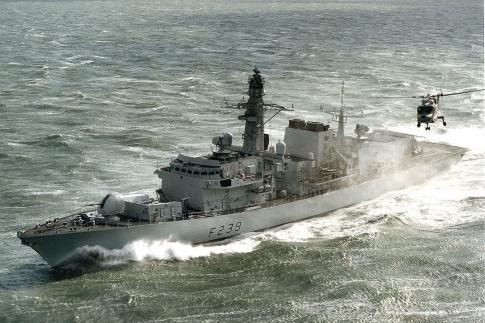UK Dispatches Warship to Tackle People-Smugglers

A Royal Navy warship will take part in operations to target people smugglers in the Mediterranean sea, immigration minister James Brokenshire has said.
A Royal Navy warship will take part in operations to target people smugglers in the Mediterranean sea, immigration minister James Brokenshire has said.
HMS Richmond will be deployed for two months to board and seize vessels off the coast of Libya, he said.
It will be the UK's contribution to an operation which is expected to be approved by the European Union.
Suspected traffickers will be taken to the nearest European port to be prosecuted in that country, he said.
BBC defence correspondent Jonathan Beale said the offer of the frigate, which will be officially made at an EU force conference on Wednesday, was a sign of a more aggressive response to the migrant crisis.
"However, Richmond would only operate in international waters - at least 12 miles off the Libyan coast," he said.
"That raises questions as to how effective this new phase of the mission will be."
Giving evidence to a Lords Home Affairs sub-committee, Mr Brokenshire said HMS Richmond would initially spend two months in the Mediterranean, with the possibility its deployment would be extended.
It is "appropriate to use military assets" because "we can't tolerate having crime on the shores of the EU", he said.
The frigate would be able to provide surveillance and reconnaissance over "vast areas", said the minister, assisting an Italian-led mission which had seen up to 4,400 people a day rescued from boats.
Prime Minister David Cameron's official spokeswoman said the European Council was expected to make a decision next month on whether, and when, to press ahead with operations to "board, search and seize" smugglers' boats on the high seas.
'No passenger service'
"We are effectively putting Richmond on the table so that if a subsequent decision is taken to get the operation kick-started, we would deploy it," she said.
Asked whether the ship would simply be ferrying migrants picked up from boats to Italy, the spokeswoman replied: "This is about boarding, searching and seizing smugglers' vessels. I don't think I have said once that it is a passenger carrying service, and it is not."
HMS Bulwark has already been involved in a search and rescue mission, saving the lives of migrants crammed into fishing boats and rubber dinghies as they made the perilous journey across the Mediterranean from Libya to Europe.
More recently a survey ship, HMS Enterprise, has been carrying out surveillance, identifying migrant flows and gaining information on the activities of the people smugglers.
Defence Secretary Michael Fallon said: "The Royal Navy has rescued thousands of people from peril but we've been clear we have to tackle the gangs behind this, which is why it's important the mission moves to the next phase."
Royal Navy frigate HMS Richmond is a sophisticated warship which can be deployed to a wide range of roles.
The Type 23 Duke Class frigate, based in Portsmouth, has a special surveillance system allowing her to cover vast areas
She carries 185 personnel and a Lynx helicopter, and is fitted with an anti-ship missile capable of striking targets more than 80 miles (128 km) away
HMS Richmond was previously used to help combat piracy off the Somalia coast and to safeguard Britain's maritime trade routes in the South Atlantic
She was built at Swan Hunter on the Tyne and was launched in 1993, and can travel at a top speed of 28 knots
Europe has been struggling to deal with a huge influx of refugees - most are fleeing the conflict in Syria but large numbers are also escaping from violence and poverty in Afghanistan, Eritrea and Kosovo.
In the latest developments, Hungary has closed its border with Serbia by building a new razor-wire fence.
Several other countries have tightened their border controls, including Germany, Austria and the Netherlands.
The vast of majority of Syrian refugees have fled to neighbouring countries such as Turkey, Lebanon and Jordan.
On Monday, Prime Minister David Cameron visited refugee camps in Lebanon and Jordan, and pledged more aid money to help those countries deal with the surge.
He said a failure to boost spending for such camps would mean many more people would try to reach Europe.
The UK has agreed to resettle 20,000 Syrian refugees over the next five years but the prime minister has come under pressure to do more./Agencies




 del.icio.us
del.icio.us Digg
Digg

Post your comment